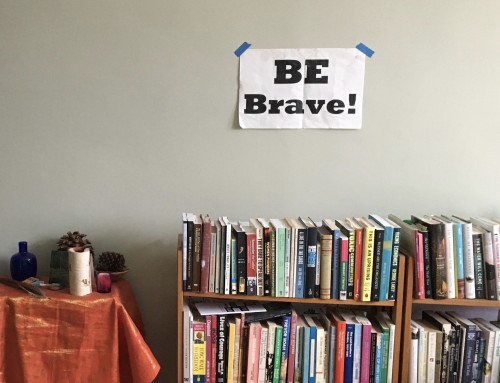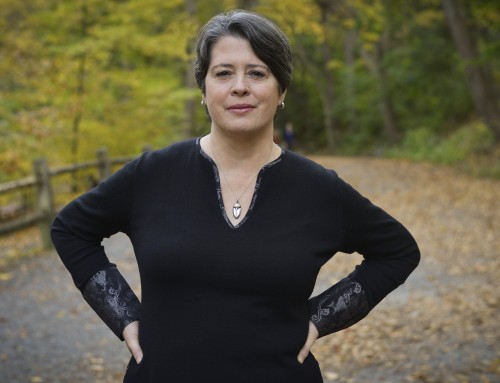 In Philadelphia, I count as a nature lover. I identify poison ivy for my friends and compost every banana peel. I’ve planted a garden in our postage-stamp-sized lot and occasionally walk in the Wissahickon. But for the past two days we’ve been visiting a friend in Northeastern, Pennsylvania who is making me feel like a total city chick. In addition to two children and a writing business, my friend has 20 something laying hens, a few roosters, a swarm of chicks, three sheep, two dogs, two cats, and a turkey that she purchased to share some kind of immunity with the chickens. (How that happens, I have no idea.) The property around her house includes woods, field, an old orchard, fox, bear, and all kinds of critters, not to mention a great diversity of birds. During our visit, she has casually used more than one farming term that I’ve needed explained. As I sat on a beautiful sheep fleece this morning, she mentioned that she tanned it herself (despite being a vegetarian who doesn’t eat any of her animals and keeps the sheep for fun). “Well, I wasn’t going to throw this beautiful fleece away,” she explained. “And I certainly wasn’t going to FedEx it in an icepack to some Amish guy in Lancaster County to tan it”—which is precisely what I would do if I were ever in possession of a dead sheep and clever enough to think of that.
In Philadelphia, I count as a nature lover. I identify poison ivy for my friends and compost every banana peel. I’ve planted a garden in our postage-stamp-sized lot and occasionally walk in the Wissahickon. But for the past two days we’ve been visiting a friend in Northeastern, Pennsylvania who is making me feel like a total city chick. In addition to two children and a writing business, my friend has 20 something laying hens, a few roosters, a swarm of chicks, three sheep, two dogs, two cats, and a turkey that she purchased to share some kind of immunity with the chickens. (How that happens, I have no idea.) The property around her house includes woods, field, an old orchard, fox, bear, and all kinds of critters, not to mention a great diversity of birds. During our visit, she has casually used more than one farming term that I’ve needed explained. As I sat on a beautiful sheep fleece this morning, she mentioned that she tanned it herself (despite being a vegetarian who doesn’t eat any of her animals and keeps the sheep for fun). “Well, I wasn’t going to throw this beautiful fleece away,” she explained. “And I certainly wasn’t going to FedEx it in an icepack to some Amish guy in Lancaster County to tan it”—which is precisely what I would do if I were ever in possession of a dead sheep and clever enough to think of that.
It’s not just the beauty of this place that’s got me thinking. It’s the intimacy with a particular natural place. This morning we had fresh laid eggs and pancakes with maple syrup made by a man who joined us for breakfast. As we finished one container of maple syrup and began a new one that tasted like the hot toddy I had last night, conversation turned to how the syrup tastes different depending on the particular trees tapped and the weather that season. It reminded me of an NPR story I once heard about how farmers in Ireland know which grazing hills produce the best butter. In Philadelphia, our butter and syrup always taste the same, and I suspect we are poorer for it.
I really have no desire to tan a sheep or tap maple trees, but if I was in danger of romanticizing the rural life, the recent news of extremist violence keeps popping to mind, reminding me that there are hate groups in this area. A good friend, walking with his wife in another part of rural Pennsylvania, recently had the word “nigger” screamed at him, twice, by a young woman in a pickup truck. I remember that story and my friend—who speaks at least five languages and understands culture and world events as well as anyone I know—and I remember why I live in the city. Although I occasionally fantasize about moving back to this area, or one like it, I would miss too much the richness of a diverse culture. I would miss the friends who might not feel safe or welcome around here. I would miss knowing that my kids are growing up with friends of many religions and hues and different types of family structures. Still, when we get home, I’m going to miss the fresh eggs and the view from the porch, not to mention the good people we love who do live here.
My fantasy is to bring these worlds together—to keep our city neighbors, but have a view with less concrete and more green. Maybe there’s a place to live where we could have both, but I haven’t found it yet.




beautiful!
Of course this resonates deeply for me! Thanks for putting words around it all.
Come to our backyard (we're not far from Eileen in the city), besides all the green in the backyard we even have a fox who has taken up residence the last few weeks! Crazy! We also have a friend who works with A. who brings us in a couple dozen fresh eggs from his chickens about once a month 🙂
It's funny but I felt that way sometimes when we lived downtown but find just the right amount of city (out the front door) and country (out the back door) here. For all the reasons you mention it's about as "rural" as I want to get 🙂
Michele
That post resonates with me as well – I have often wondered why we can't bring the good of those two worlds together and leave the bad behind us.
Hmmm. In spite of a predominantly white populace, is there really more racism in rural areas? Perhaps in your friend's area there is. I know some areas of my state are known for harboring hate groups, but that isn't the case for all rural areas of the state. There are hate groups in urban areas too — quite a few of them. I think the main difference is that there are so many potential "targets" for their hate in a city that they don't bother yelling slurs out the truck window. They just glower privately then spew venom on-line when they get home. I live in a small-to-medium size Midwestern city in a mixed race family. I feel like we certainly stick out less in the city than we would in a rural area, but I'm not sure I feel safer from serious personal or property crime. Safer from yelled epithets however? Sure, and that counts for something, especially for the children.
That said, we also lived in Boston for several years, pre-kids. I did enjoy the wide range of cultures and all, but I found the racial atmosphere to be nearly toxic and would NOT have wanted to raise bi-racial children there. I'm not sure the rural experience would have been any worse. Again, the main problem would have been the issue of being such an extreme minority and the isolation associated with that. However, I'm not at all convinced that our treatment by rural Caucasians would have been any worse than our treatment by urban Caucasians, generally.
Regarding feeling close to the land, we are lucky to have an urban lot that is large and can support a good size garden, fruit trees, and yes, even chickens, though we don't have any. (Yet!) I consider this to be the best of both worlds and we are working on making the most of our "urban homestead"!
Thanks for all the comments. I have thought, Michelle, that a house near here with a bigger yard might be ideal (if we could afford it), though I do think there is something different about walking on land where there might be bear or mountain lion. It's humbling.
As for Natural Mom's comments, I totally agree that racism is not absent in the city. I had thought about that after I posted. I'm sure when you're in a mixed-race family you can't escape it, wherever you go, and I can see how a community that thinks it is open minded, but isn't really, could be more frustrating in some ways. And you're right that not all rural areas are the same, and I shouldn't make assumptions about the one I was staying in, though I remembered when I lived in that region seeing a lot more Confederate flags than one would expect so far north of the Mason-Dixon line.
That said, I'm writing from the perspective of a white person who wants a diverse community for herself and her white kids. When I lived in South Gibson and later in Scranton (or for that matter, at Pendle Hill in the early 90s), that was something I missed.
Eileen, I don't think you were (are?) as far north of the Mason-Dixson line as you think. It forms the southern border of Pennsylvania. Or maybe you already knew that… 🙂
I spent some time living in northeastern PA. The picture you posted brought back memories I enjoy remembering.
Unfortunately, hate, racism and symbols of hate and racism can be found anywhere. That's why we need more than ever to let our lives speak in another way.
cath